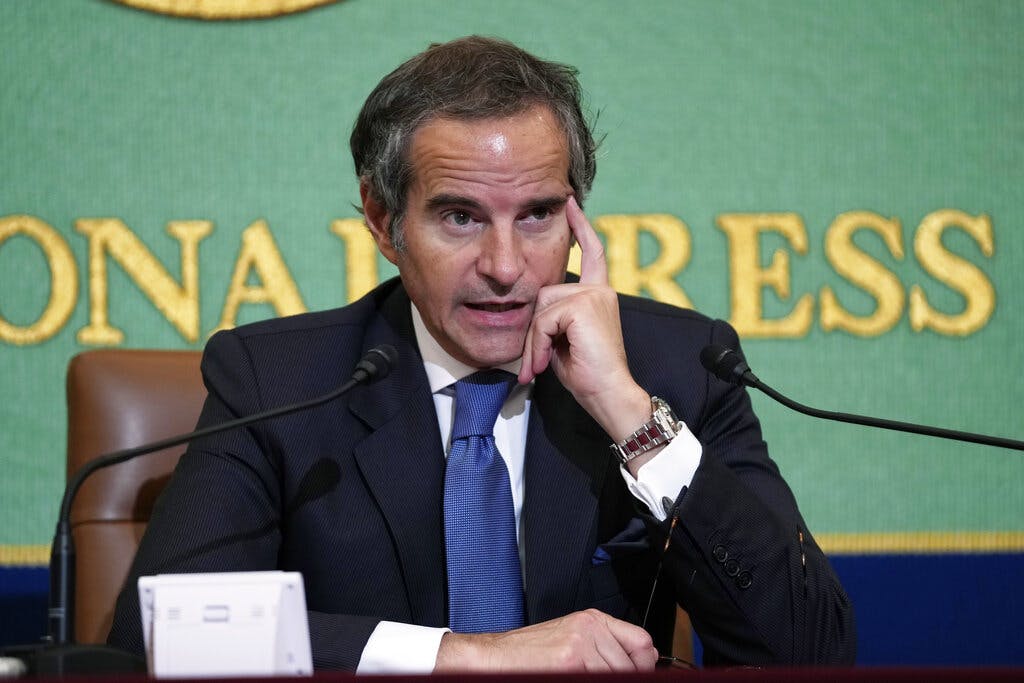UN’s Atomic Watchdog Shows Up in Israel Ahead of Key Speech
‘We reserve the right to defend ourselves,’ Prime Minister Bennett tells him.

Following today’s rare visit to Israel, the head of the United Nations nuclear watchdog, Rafael Grossi, is expected to deliver a speech Monday at a crucial Vienna meeting of the body’s board of governors.
Mr. Grossi made the quick Israeli visit amid growing frustration surrounding the diplomacy to revive the 2015 nuclear deal with Iran. Israel has long said that because it is not a party to the deal, it would not abide by it.
“We reserve the right to defend ourselves,” Prime Minister Bennett said after this morning’s meeting with Mr. Grossi. Using intelligence it has gathered in Iran, Israel has lately helped the Vienna-based International Atomic Energy Agency grasp the scope of the Islamic Republic’s inspection evasions.
The IAEA, in its latest report, makes a note of Tehran’s refusal to explain how traces of uranium were found in three undeclared sites. Citing diplomats and former IAEA officials, Bloomberg reported on an argument that the traces date back to Iran’s decades-old dealings with the late Pakistani nuclear smuggler, Abdul Qader Khan.
Despite such dismissals, the IAEA report is considered damning enough for Western countries to have prepared a resolution condemning Iran’s non-cooperation with the agency. The text, set by America, France, Britain, and Germany, and first leaked to Reuters, would demand an Iranian explanation of the IAEA discoveries.
If the text’s resolution is agreed to by a majority at the 35-member IAEA board of governors, Iran would be forced to comply with the demand. Otherwise the matter would be referred to the UN Security Council, where new global sanctions could be imposed.
Even as a mere proposal, the text reads like a sharp departure from the approach previously taken by the four Western countries that alongside Russia and China agreed with Iran in 2015 to a deal known as the Joint Comprehensive Plan of Action.
President Trump removed America from the JCPOA in 2018, and a year later America prepared a text threatening an IAEA condemnation. As a result of the threat, Iran complied with the agency’s demands. Yet, unlike Mr. Trump, President Biden remains adamant on renewing the deal. A rebuke of Iran now could undermine his diplomatic efforts.
Mr. Grossi’s predecessor at the IAEA’s helm, Yukiya Amano of Japan, who died in office in 2019, was more interested in assuring that the JCPOA survived than in making effective inspections in Iran, according to diplomats and agency officials who worked at Vienna at the time.
Things changed fundamentally when Mr. Grossi, a 61-year-old Argentine, emerged as Amano’s successor. Amano’s IAEA reports were mostly mum, for one, about a trove of documents Israel secreted from a warehouse at the heart of Tehran in 2018.
While inspectors studied the mountain of documents, Vienna-based diplomats and IAEA officials endlessly leaked a dismissal of the Israeli findings as old, outdated, and irrelevant.
Mr. Grossi is widely considered a straight shooter. Before his tenure, the agency’s reports read like they were carefully designed to assure no finding would consist of an Iranian “material breach.”
According to the UN Security Council resolution that endorsed the JCPOA, such a finding could null the deal. Mr. Grossi’s reports, in contrast, read like the fictional Joe Friday’s “just the facts, ma’am.”
Mr. Grossi’s latest IAEA report addresses, among other findings, the issue of the undeclared sites that the agency has learned about from the Iranian archive supplied by Israel. That Iran refuses to explain how traces of man-made uranium were found there shows the discovery of those sites is unlikely to merely be old news from the AQ Khan era.
Evasion again became clear as the Wall Street Journal last week reported on classified IAEA documents that Iran had stolen for the purpose of escaping prying inspectors’ eyes. According to the Journal, the documents were given to it by an unidentified “Mideast” intelligence agency.
Later in the week, though, Mr. Bennett removed all doubt about that agency’s identity when he posted some of the documents on his social media accounts. Those, and other findings from Israel’s deep infiltration inside Iran, were undoubtedly on the top of the agenda of Mr. Grossi’s meetings in the country on Friday.
Some in the Vienna atomic agency consider Israeli intelligence a mere nuisance and an attempt to harm diplomacy with Iran, which they prize above all. Mr. Grossi’s rare visit in Israel shows that for him, any evidence of Iranian violations needs to be examined, regardless of where it came from or the political motivation behind collecting it.
That approach gives the IAEA a necessary shot of credibility it had lacked in the past. The Vienna-based agency was sold by the Obama administration as a cornerstone of the JCPOA.
An Obama-era secretary of state, John Kerry, said the deal would provide “the most intrusive inspection regime in history,” and that IAEA undeclared visits to Iran could be made “anytime, anywhere.” Over the years, however, Iran barred inspectors’ entry to military facilities and other sites, and otherwise undermined the IAEA.
When Mr. Grossi addresses the IAEA board on Monday, he will do more than just display his capacity to get the agency back on track. His speech could have great ramifications for the future of Mr. Biden’s diplomacy with Iran.

